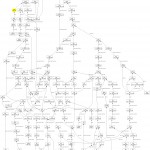- If, 10,000 years ago, Neolithic plant breeders had domesticated another plant that would have today produced a highly desirable crop, what would that be, and is it too late to start now?
- How can we combine traditional plant breeding techniques, biotechnology and GMOs to prepare the world’s crop plants for oncoming climate change?
- How can we retain biodiversity in crop resources?
- Will every farmer in the world be able to get a crop genotype specifically produced to get the best from his/her field?
- Given the medium to long term unsustainability of oil-based high input industrial agriculture, should we be developing high yielding perennials to replace existing annuals?
Some of the questions submitted to the Journal of Experimental Botany from which will be selected the 100 most important questions facing plant science. And they’re pretty good questions. I found them by searching for “crop” and “agriculture.” The tag line for the survey — and title of the CABI blog entry which pointed me to it — is: How can plant scientists change the world? Go on and submit your own ideas. Conservation of agrobiodiversity does not seem to be particularly well served thus far. You’ve got until the end of March.
